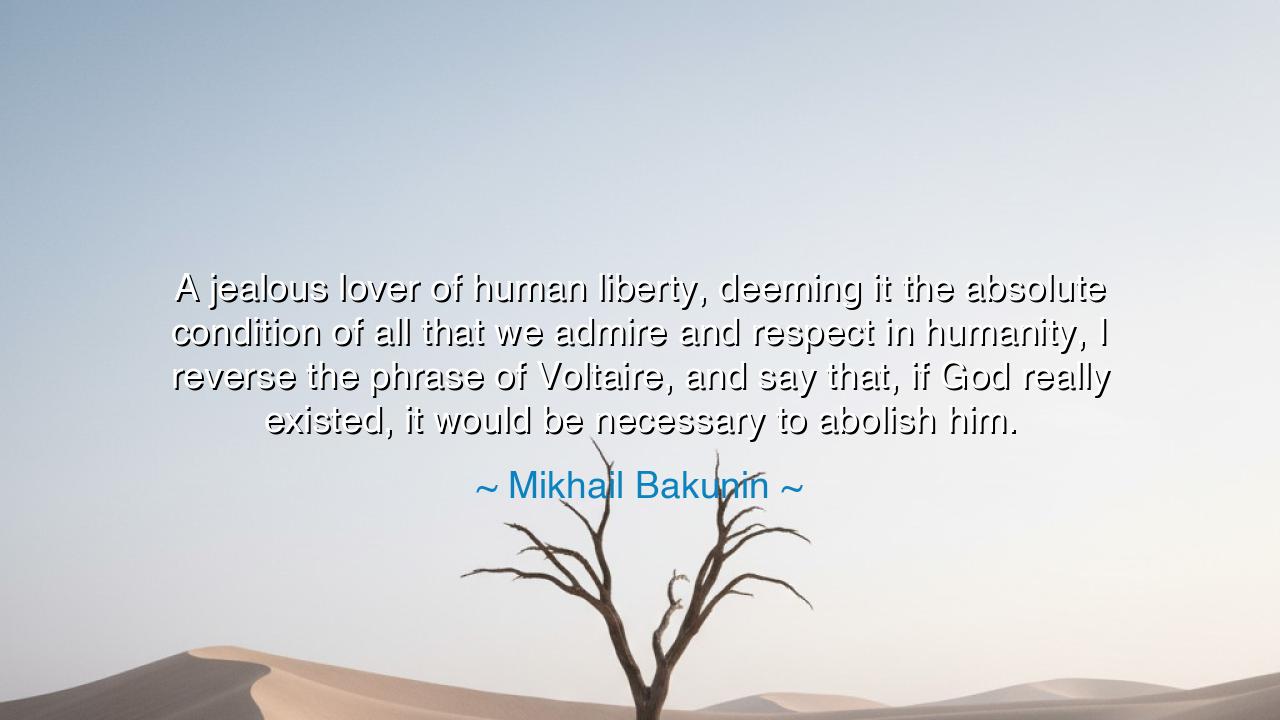
A jealous lover of human liberty, deeming it the absolute
A jealous lover of human liberty, deeming it the absolute condition of all that we admire and respect in humanity, I reverse the phrase of Voltaire, and say that, if God really existed, it would be necessary to abolish him.






The words of Mikhail Bakunin—“A jealous lover of human liberty, deeming it the absolute condition of all that we admire and respect in humanity, I reverse the phrase of Voltaire, and say that, if God really existed, it would be necessary to abolish him.”—burn like fire from the lips of one who would not bow to any power above the freedom of man. Here, Bakunin speaks as the prophet of anarchism, defiant against all chains, declaring that liberty is the highest treasure, and that any being—even the divine—who would subjugate it must be cast down. It is a cry both heroic and dangerous, filled with the passion of one who sees in authority not guidance but enslavement.
Bakunin’s declaration begins with Voltaire, who had once said, “If God did not exist, it would be necessary to invent Him.” Voltaire saw the divine as a guarantor of order, morality, and justice among men. But Bakunin, fiery and unyielding, turns this saying on its head: to him, the very idea of God represented not freedom but servitude. For if there were a being of infinite authority, then all human wills must bend to his will; and if this were so, then human liberty, the essence of dignity and creativity, would be destroyed. Better no God at all, said Bakunin, than a God before whom men are forever slaves.
History offers us the backdrop of his words. In 19th-century Europe, the people were rising against kings, churches, and empires that demanded obedience. The church often sided with power, blessing thrones and crowns, and urging the poor to endure their misery as the will of Heaven. Bakunin, seeing this, concluded that the very notion of a divine ruler was the model for all earthly tyrants. To abolish kings, one must also abolish the idea of God, for both claimed absolute sovereignty. To preserve liberty, the spirit must bow to no master, earthly or divine.
The ancients themselves wrestled with this tension. Prometheus, the Titan, defied the gods of Olympus by stealing fire and giving it to mortals. For his love of mankind, he was chained and tortured. His story, though mythic, mirrors Bakunin’s cry: that sometimes to serve humanity is to defy the gods, to reject authority that demands submission at the cost of growth and freedom. Prometheus stands as the ancestor of Bakunin’s thought, the heroic rebel who loves men more than he fears gods.
Yet Bakunin’s words also hold a warning. To abolish God is not simply to topple an idol; it is to proclaim that man himself must bear the full weight of justice, morality, and order. If there is no higher law, then human liberty becomes both the crown and the burden of existence. Men must no longer look upward for guidance but inward, to conscience, to reason, to compassion. And here lies both glory and peril—for liberty unmoored from virtue may birth not freedom but chaos.
The lesson for us is not to dismiss faith, nor to embrace rebellion blindly, but to recognize the sacredness of human liberty. Whether one believes in God or not, the truth of Bakunin’s cry is that liberty is the soil in which all that is noble in humanity grows—creativity, love, courage, justice. Without liberty, these wither into obedience and fear. But liberty must also be married to responsibility, lest it become a flame that burns rather than warms.
Therefore, let us learn from Bakunin’s passion, but temper it with wisdom. Love liberty with zeal, for it is the breath of the soul. Resist tyranny, whether it comes robed in government, dogma, or the chains of fear. But also remember that true liberty is not license, but the power to live with dignity, to honor others as free beings like ourselves. For in this balance lies the greatness of humanity: to walk unbound, yet not alone; to live free, yet not lawless; to cherish liberty, yet never forget that its highest use is in the service of love.






AAdministratorAdministrator
Welcome, honored guests. Please leave a comment, we will respond soon